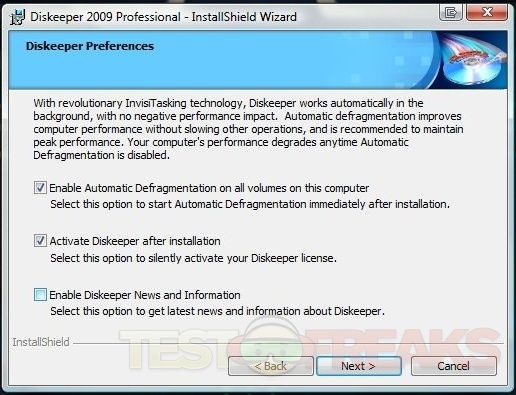

WHY is there still NO defrag program that takes defragmentation from a new view: containers. I'll repost if I find out more - in a few months all new products will be out and I will give them all a new hominis est errare, nullius nisi insipientis in errore persevareĪll spelling mistakes are my own and may only be distributed under the GNU General Public License! - (© 95-1 by Coredump 2-10 by DevNullius)
#Diskkeeper run defrag Offline
If your plan to use your computer for the next 5 years, you will NEED to defragment with offline tools! Fast hardware, RAM and magnetic harddrives with plenty of cache (>16, 32MB) will reduce the need for defragmentation, but only for the short run. In extreme cases I've seen boot times of 20 minutes drop down to less then 5 minutes after defragmentation. DK will need at least 15 defragmentation rounds, with more IO, more time and less contiguous freespace.įragmentation still is important, ESPECIALLY on older computers.
#Diskkeeper run defrag full
They use RAM).įor example: an extreme fragmented older harddisk, 60% full will require 3 to 6 defragmentation rounds to get it all defragmented. bytes) to achieve more results.įor now, my choice remains Perfectdisk: set and forget with no noticeable performance impact (except for the services being started. Unknown if it is as complete as PD's offline defrag.Īlso, when looking to the processes in Task Manager, you will see that PD handles less data (IO.
#Diskkeeper run defrag free
In this thread, I also found a reference to the program Puran Defrag Free - it looks promissing AND i wouldn't have to use a warez version, so I'm definitly checking it out - it even supports offline defragmentation. I would love an option just to remove the pagefile at boot-time and reserve a big enough amount of freespace for Windows to recreate the pagefile. Sometimes, it just doesn't get your swap-file defragmented, no matter how much free space there is available. Then, new files created by Windows have a big chance of being created unfragmented (or at least are easily defragmented). With PD, you would have all files organized WITH a maximum of freespace. But it fails in one aspect: you lose your biggest free space very fast. Also, PD offers an extra screensaver-mode.ĭK tries to keep fragmentation at 0 when new files are created. Both detect system resources, both work when computer is idle. DK works with multiple-passes: it defrags your disk in subsequent passes. BUT, Perfectdisk works with single-pass (meaning: one run should defrag your whole disk to perfection - not always true in practice, but certainly PD has a very fast convergence point to a near 100%).

In this thread, there seems to be a little confusion: Perfectdisk and Diskeeper both have auto-maintenance.

Also tried O&O which looked promissing with it's range of defrag strategies, but failed: it was like a dog chasing its own tail - it will never get there.Īlso, the biggest selling point for Perfectdisk was it's ability to defrag all aspects of NTFS with it's offline defragmentation techniques. 4 years ago I still used Diskeeper, but found it (on the long run) too resource intensive. My last round of investigating 2 years ago, re-confirmed my choice for Perfectdisk. I'm a computer-expert and defragging since the old ms dos days (norton defrag).


 0 kommentar(er)
0 kommentar(er)
